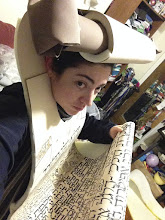 Last night I subjected my roommate to The Great Muppet Caper, and watching her flip out over the cameos was nearly as enjoyable as watching the movie itself. She recognized most of them on her own. I've got a swell roommate.
Last night I subjected my roommate to The Great Muppet Caper, and watching her flip out over the cameos was nearly as enjoyable as watching the movie itself. She recognized most of them on her own. I've got a swell roommate.And what a swell film. Every character gets at least one moment to shine and at least one wacky one-liner (Lew Zealand repeatedly offering up his paper towels makes no sense, but always earns a laugh.) The Muppets triumph over adversity by means of genuine weirdness and tremendous song-and-dance numbers. The songs themselves range from rockin' Muppety funk, to sweet Muppety innocence, to monumental theatrical extravaganzas. And in spite of all this, Charles Grodin steals the show every dang time. He can't even do anything about it; he's too distraught by the ketchup on his cummerbund.
Everything looks terrific. The over-the-top, purportedly high-fashion costumes are ridiculous - culminating in the perfect teeny-weeny hat. Miss Piggy looks fantastic throughout; I wish someone would pay as much attention to her overall look now as someone was obviously paying to each individual outfit (and each wig, and each pair of heels) she wore in GMC. And the Dubonnet Club set, with its mirrored walls and lit floors, provides the perfect showcase for her to let loose with her mad tap-dancing prowess.

That's the most satisfying aspect of this movie. It may not be set in a theater, but the Muppets are playing themselves, filling in for the roles in a musical comedy that belongs to a grander era, which proves to be the ultimate venue for their talents. Naturally, in a setting like that, both the romantic leads deserve (and fully avail themselves of) showstopping tap-dance breaks; our imaginary 1940s audience expects it.
Furthermore, in a movie like this, all of Miss Piggy's delusions of divahood can come to pass. In this half-fanciful, half-real universe, everyone comes to see Piggy as the the star she's always known herself to be, in the scenes (and couture) that she so thoroughly deserves. She starts as a mere wannabe in Lady Holiday's office, but she carries herself through the farce so spectacularly (and dresses so smartly; I cannot emphasize this enough) that after the scenes at the nightclub, at the fashion show, and in her very own water ballet, Nicky's battle for Piggy's affections can simultaneously be deliciously absurd, and make perfect sense.
And my goodness, words can't fully do justice to Frank Oz's acting. Miss Piggy's "I don't need this lousy duck pond" scene is one of my favorites in Muppetdom, but Fozzie, too, is (in Piggy's words) playing eight hundred different emotions. Fozzie is devoted to Kermit to the end: his passion shows in his motivational speech to the gang; his fervor and naivete come through in his conviction that he'll accompany Kermit to his night on the town; he even gives a lovely, wistfully quiet sigh as he watches Kermit and Piggy dance.
Plus, Muppets on bicycles! They always, always make the sun shine.



